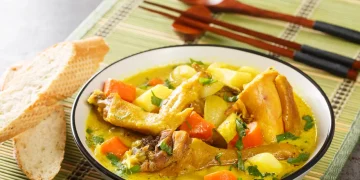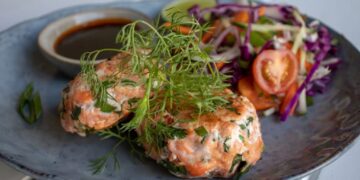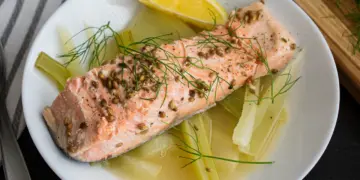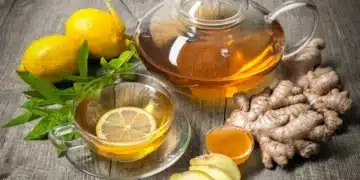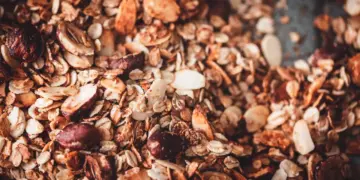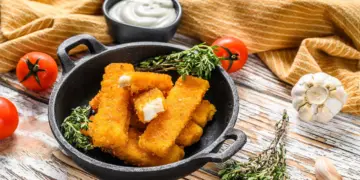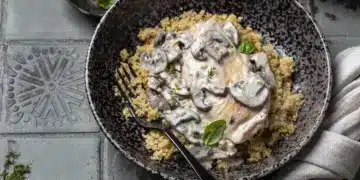Honey and Lemon Tea: Cold and Flu Tea Recipe
Hot Lemon and honey tea soothes a sore throat
A hot cup of lemon and honey tea is another thing that can be comforting for someone with a cold.
There’s actually no tea in the tea. Honey, lemon juice and hot water are all that’s needed.
It’s great, especially when you have a cold or congestion. Honey soothes your throat and lemon juice cuts through congestion.
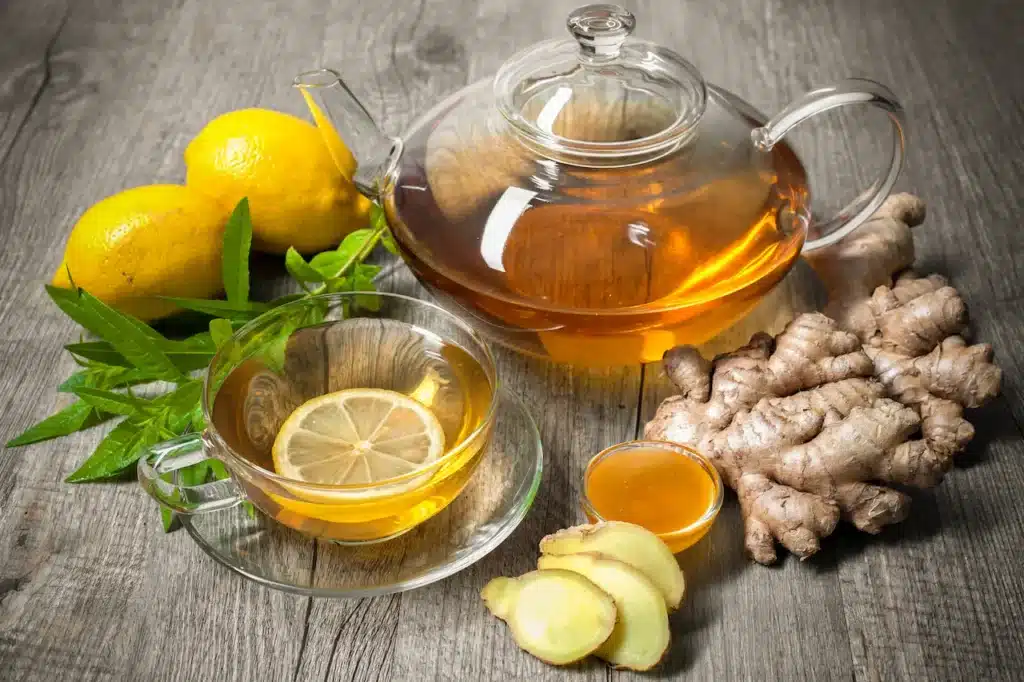
Add Ginger to Hot Lemon Honey Tea
Honey and lemon tea can be flavored with fresh ginger. I sometimes just pour hot water over the ginger. It’s also good!
Usually, honey and lemon is all you need. Please excuse me as I finish the last item on my list: rest. Goodbye.
Herbs can boost your immune system
Herbal teas brewed from dried leaves offer a wealth of vitamins, minerals, and antioxidants that can significantly strengthen your immune system’s resilience. While there are commercially available immune-boosting teas on the market, homemade herbal blends may offer fresher options with higher concentrations of active ingredients resulting in greater health benefits.
Personalizing your own herbal tea allows you to customize its ingredients to meet both personal taste preferences and health requirements. For instance, you might include ingredients known for their immune-boosting effects, like echinacea, ginger or elderberry; you could then incorporate flavors like mint or chamomile for an enjoyable drinking experience that also meets specific wellness goals.
Crafting your own herbal tea can be therapeutic in itself. Crafting your own blend helps promote mindfulness and connection to ingredients, deepening appreciation of all of nature’s healing assets at your disposal. By experimenting with various herbs and proportions, you may discover unique combinations that bring comfort while improving overall health and well-being.
You can boost your immune system by drinking tea every day.
Herbs that combat cold and flu symptoms
Many natural ingredients have long been recognized for their medicinal and antioxidant properties, making them integral to traditional healing practices across various cultures. For centuries, people have turned to these natural remedies to alleviate a wide range of symptoms and to bolster their immune systems against illness.
Ingredients that you can purchase in the produce section include:
- Citrus. Citrus juice and peel are high in vitamin C and can help to keep viruses away and reduce the severity if you get sick. Vitamin C helps to fight phlegm, and it strengthens your immune system. Add lemon or orange peels to your teas.
- Ginger. Ginger is known for its anti-inflammatory properties and soothes a sore or a congested throat.
- Peppermint. Its refreshing taste and decongestant qualities help combat cold and influenza symptoms, clear the sinuses, relieve headaches, and reduce respiratory discomfort. This promotes a faster recovery.
- Cinnamon. The antimicrobial and viral properties of cinnamon are well-known. It is effective against both viral and bacterial infections.
- The herb Thyme. This herb contains antimicrobial compounds such as thymol, carvacrol and a number of other compounds. Thyme tea is good for respiratory problems such as sore throats and coughs.
- Lemongrass. Lemongrass is antibacterial and antifungal, which can be used to treat and prevent infections. It has a soothing affect on the respiratory system and can be used to relieve coughs, colds and flu symptoms.
- Honey. Although not technically a product, raw honey can be found in the produce section. Honey has antimicrobial properties and can soothe sore throats and coughs. It contains antioxidants to support immune health and tastes delicious, adding a hint of sweetness.
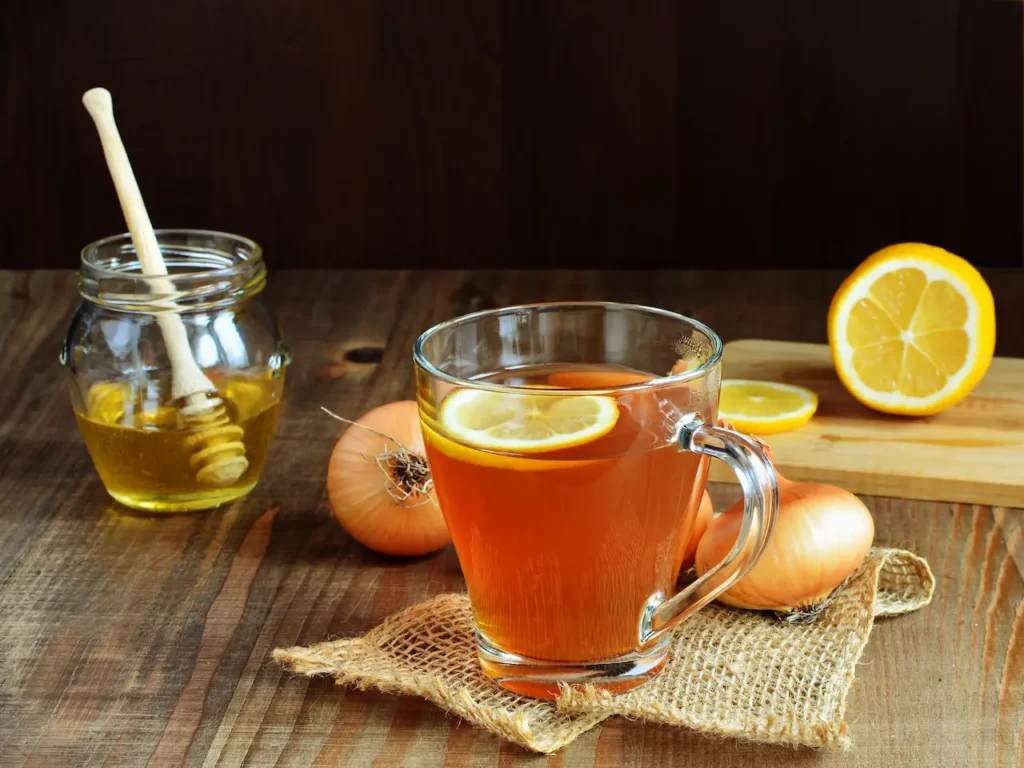
These herbal supplements are available at natural food shops:
- Elderberry. Elderberry is renowned for its powerful antiviral properties and has been used by many to relieve symptoms of colds and influenza. Elderberry tea is rich in vitamins and antioxidants, which can reduce flu symptoms such as fever, cough and body aches.
- Echinacea. Widely known for its immune-boosting properties, echinacea is a plant that can be made into a tea to help relieve symptoms like sore throats, congestion and fatigue.
- Lemon Balm. Lemon balm is known for its antiviral and calming properties. It can relieve headaches and muscle pains that are commonly associated with flu. Its soothing properties can promote relaxation and sleep quality. Both are essential for a quick recovery.
- Ginseng. Ginseng, an adaptogenic herb that modulates the immune system. It can help to boost your immunity and reduce cold and flu symptoms.
- Camomile. The anti-inflammatory and calming properties of chamomile are well known. It helps reduce stress and promotes relaxation. This is important for supporting your immune system when you are more susceptible to colds or flu.
Every winter, on this side, we swap our outdoor picnics for game nights, holiday parties, and indoor games. As we gather indoors, the first sniffles spread.
You’ll hopefully only have to sneeze a few times and you will be able to make it through the change of seasons without any problems. More and more, it seems like we’ll wake up with more than just a stuffy nasal and scratchy throat.
But it’s not inevitable. In the aisles at your local grocery store, you can find a variety of immune-boosting tools. Homemade herbal tea is more than just comforting and warming. It can also be a natural remedy for seasonal viruses.
We think that you should visit your doctor to obtain boosters, if not already done so. Stock up on tea ingredients in the produce section.
Add homemade herbal teas to your routine
It’s easy to make herbal tea at home. Once you have gathered all your ingredients, a little light chopping is required.
Chop the large pieces into smaller pieces that can fit in a teabag. If the ingredients are not dried and fresh, you can use the back of a teaspoon to gently smash the leaves and stems to release oils.
Peel the citrus and juice it. To add dried ingredients to your tea, use 1/8 – 1/4 tsp for each cup.
Add about 2-4 cups water to a small saucepan. Pour enough tea ingredients to fill a teabag about half full per cup. Bring to a boil and simmer for 5 minutes. Taste and add a little honey. You can adjust the steeping time or any ingredient to achieve the flavor and strength you desire.
It’s not a precise science. Try different things to find the experience that you want. Enjoy yourself and stay healthy.
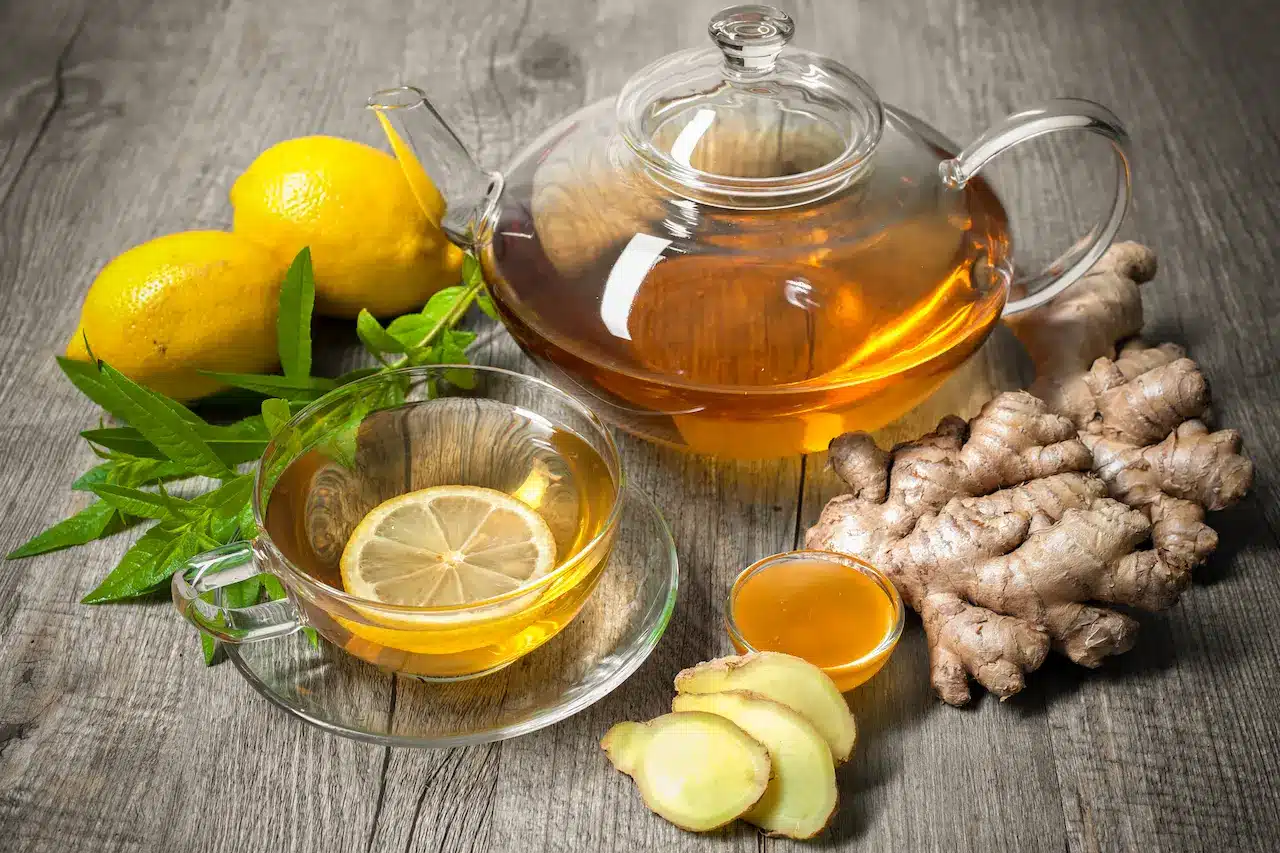
Honey and Lemon Tea
Ingredients
Method
- Put honey and lemon juice into a tea cup or mug. Add hot water and stir. Add more lemon juice, honey, or hot water to taste.


